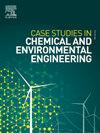Current scenario and potential of waste cooking oil as a feedstock for biodiesel production in Indonesia: Life cycle sustainability assessment (LCSA) review
Q1 Environmental Science
Case Studies in Chemical and Environmental Engineering
Pub Date : 2024-12-13
DOI:10.1016/j.cscee.2024.101067
引用次数: 0
Abstract
WCO is a second-generation biofuel made up of accumulated free fatty acids, which can be used as feedstock for biodiesel production. The review aims to: (a) evaluate the sustainability of waste cooking oil (WCO) for biodiesel production in Indonesia using life cycle sustainability assessment (LCSA) methods; (b) explain the challenges, development, recommendation, and industrial potential of WCO for biodiesel production in Indonesia; and (c) determine the sustainability concept of WCO for biodiesel production. This study was carried out by reviewing papers related to LCSA which include Life Cycle Assessment (LCA), Life Cycle Cost Analysis (LCCA), and Social Life Cycle Assessment (SLCA). The review found that the WCO collection, pretreatment, and transesterification processes have the biggest environmental impact caused by the use of chemicals, catalysts, and electrical energy from fossil fuels. According to the LCCA results, WCO-based biodiesel production has a high economic potential and is more practicable due to lower raw material and production costs than biodiesel from edible and non-edible plants. Meanwhile, the SLCA aspect emphasizes that the WCO-based biodiesel industry must consider social indicators such as employment provision, human rights, human health impact, working conditions, local community impact, cultural heritage, socio-economic repercussions, governance, and large accident risk. There are several recommendations that can be made to develop WCO-based biodiesel, namely the government must demonstrate political commitment by promoting WCO as a national energy source feedstock. The sustainable concept has three pillars: environmental, economic, and social. These pillars must simultaneously direct every stage of the WCO production process. To produce high-quality biodiesel, the government must support all of these stages, establish regulations and governance for WCO supply and the WCO processing industry, and provide implementable R&D, adequate funding, and a campaign to raise awareness of the importance of reprocessing WCO into potentially profitable biodiesel in a circular economy.
印度尼西亚废弃食用油作为生物柴油生产原料的现状和潜力:生命周期可持续性评估(LCSA)审查
WCO是由游离脂肪酸积累而成的第二代生物燃料,可作为生产生物柴油的原料。该审查旨在:(a)使用生命周期可持续性评估(LCSA)方法评估印度尼西亚生产生物柴油的废食用油(WCO)的可持续性;(b)解释世界海关组织在印度尼西亚生物柴油生产方面的挑战、发展、建议和工业潜力;(c)确定世界生物柴油组织生产生物柴油的可持续性概念。本研究以生命周期评估(LCA)、生命周期成本分析(LCCA)和社会生命周期评估(SLCA)为研究对象。审查发现,由于使用化学品、催化剂和来自化石燃料的电能,WCO的收集、预处理和酯交换过程对环境的影响最大。根据LCCA结果,基于wco的生物柴油生产具有很高的经济潜力,并且由于原料和生产成本低于食用和非食用植物的生物柴油,因此更具可行性。同时,SLCA方面强调,以wco为基础的生物柴油行业必须考虑社会指标,如就业提供、人权、对人类健康的影响、工作条件、对当地社区的影响、文化遗产、社会经济影响、治理和重大事故风险。发展以WCO为基础的生物柴油有几个建议,即政府必须通过促进WCO作为国家能源原料来展示政治承诺。可持续发展的概念有三个支柱:环境、经济和社会。这些支柱必须同时指导海关组织生产过程的每一个阶段。为了生产高质量的生物柴油,政府必须支持所有这些阶段,建立WCO供应和WCO加工行业的法规和治理,并提供可实施的研发、充足的资金和一场运动,以提高人们对在循环经济中将WCO再加工成潜在利润生物柴油的重要性的认识。
本文章由计算机程序翻译,如有差异,请以英文原文为准。
求助全文
约1分钟内获得全文
求助全文
来源期刊

Case Studies in Chemical and Environmental Engineering
Engineering-Engineering (miscellaneous)
CiteScore
9.20
自引率
0.00%
发文量
103
审稿时长
40 days
 求助内容:
求助内容: 应助结果提醒方式:
应助结果提醒方式:


